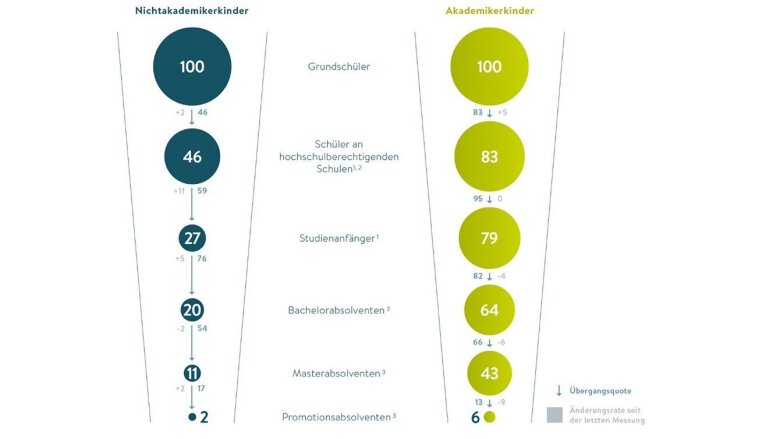
For those who are the first in a family to embark on the path to academia, it is often not easy. This affects both doctoral researchers from non-academic households and doctoral researchers with a migration background. To support those, we have compiled some information here: how to finance a doctorate, where to find networking opportunities and how to overcome the feeling of alienation in the academic world.
-
Academic employee
Researchers from non-academic backgrounds are often confronted with the expectation of their families, especially their parents, that they should "finally earn some real money". The doctoral phase differs here from the study period: jobs are offered specifically to finance doctorates.
A common way of funding a doctorate is to be employed as a research assistant at a department or in a third-party funded project. In order to obtain such a position, it is often a good prerequisite to have previously worked as a research assistant during your studies. The doctoral positions are usually advertised for three years or the duration of the externally funded project.
You can find more information on this form of financing here.
-
Structured doctoral programmes
Increasingly, there are so-called structured doctoral programmes, for example in the form of graduate schools or research training groups. In these programmes, you do research and complete your doctorate with a thematic focus on a common research topic. Normally, these positions are funded via scholarships or funded positions. Typically, admission is done by a selection process of an allocation commission on a predetermined date. The transparent selection process and the more structured nature of the doctorate in these programmes lead (in addition to other factors) to a considerably higher proportion of doctoral researchers from non-academic backgrounds, with a history of migration or of international origin in the structured programmes.
Further information on structured doctoral programmes at the University of Jena can be found here.
-
Doctorate scholarship
In order to receive a doctoral scholarship, a 6 to 12-month search and application phase must first be bridged and financed after the Master's degree. Unfortunately, bridging grants are rarely available (one exception are the "Exposé" scholarshipsExternal link at the University of Göttingen). Another complicating factor is that the 13 Organisations for the Promotion of Young Talent (Begabtenförderungswerke), which award the most doctoral scholarships in Germany, place a special focus on social and civic activities. But if you had to finance your studies through part-time jobs, it can often be difficult to become socially active as well. However, there are also scholarship institutions that (in addition to the required commitment) explicitly take social background and financial situation into account when selecting scholarships. These include the Friedrich-Ebert-Stiftung, the Hans-Böckler-Stiftung, the Heinrich-Böll-Stiftung, the Rosa-Luxemburg-Stiftung and the Stiftung der deutschen Wirtschaft.
You can find more general information on scholarships for doctorates and on how to apply for these here. In addition, the ApplicAid initiativeExternal link offers support to doctoral researchers from non-academic backgrounds in applying for a scholarship.
-
Extra occupational doctorate
Some companies offer their employees the opportunity to do a doctorate while working. The employment contract then specifies what proportion of working time can be used for the doctorate. In order to find out whether this is possible in your company, you should consult your employer at first. Once this has been clarified, you must find a supervisor at a research institution who would supervise your doctoral project.
Even if your company does not offer the option of taking time off to do your doctorate, you can do your doctorate while working. In particular, if you have already completed vocational training or a certain profession prior to your studies, you can use this to finance your doctorate. In this case, you can work in your learned profession and pursue your doctorate alongside this activity. But you should consider that this can be a heavy double burden and hence it may take considerably longer than three or four years to complete a doctorate in this way. It is important that you find a supervisor with whom you can discuss the time horizon of your doctoral project. You can find more information on finding a doctoral supervisor here.
-
Academic language
For people entering the academic world, the used language can seem strange and hifalutin: On the one hand, it certainly makes sense to use technical language when certain concepts and ideas are established in an academic discipline. On the other hand, however, it can also be a way to intimidate others with eccentric language or to cover up one's own lack of knowledge. As early as in the 1970s, this negative side was described by Wolf Wagner as the " university bluff". In his German book "Uni-Angst und Uni-Bluff"External link (which has been reprinted time and again), he described various strategies of how this bluff is used at universities - especially in the humanities and social sciences. It can be very helpful to look at these bluff rules and strategies, as this reduces the feeling of strangeness in the academic world and makes it clear that here, too, people only boil with water. An interview with the author and some of the bluff rules can be found hereExternal link (in German).
-
Impostor syndrome
In people from non-academic households or with a migrant background, the feeling of alienation often manifests itself in the so-called impostor syndrome: people believe that their own achievements are not due to their own abilities, but only to coincidences or special circumstances, and that they are actually incapable and deficient, but that others have not yet discovered this. It is therefore only a matter of time before they are exposed as an impostor by others. However, this syndrome is widespread in academia in general, regardless of one's social background - particularly due to the often insecure career paths and enormous competitive pressure. Further information on this syndrome in academia can be found hereExternal link.
-
Lower participation in higher education qualifications
Unfortunately, the openness of the German higher education system for people from non-academic families is still not very high: out of 100 primary school pupils from academic families, 10 achieve a doctorate, while only one person from non-academic backgrounds does so. The figure below from the German Higher Education ReportExternal link graphically illustrates when most non-academic children leave the education system: Access to studying is a very big hurdle, but many non-academic children also drop out in the phase after graduating with a Bachelor's degree. On the one hand, this is due to the fact that many prefer to opt for paid employment after graduating with a Bachelor's degree rather than following a further (cost-intensive) qualification phase. On the other hand, a disproportionately large number of non-academic children also drops out of the Master's programme - probably due to financing problems. A similar dynamic is likely to be observed after completion of the Master's degree.
Differences in reaching the next level of education
Image: Hochschulbildungsreport 2020 -
Reasons for the declining rate of doctorates of the first generation
Overall, the rate of doctorates awarded to researchers from non-academic backgrounds has declined in recent years (cf. Jaksztat/Lörz 2018External link). There are various reasons for this: On the one hand, the doctoral rates of non-academic and academic researchers differ significantly by subject. This is due to the choice of subject at the beginning of studies: Students with a non-academic background are significantly overrepresented in humanities and social science subjects, while students with an academic background are overrepresented in medicine and law. In the natural sciences, the two groups are roughly equally distributed. In recent years, the doctoral rate in the subjects of law and medicine has risen significantly (in law from 7 to 20 percentage points and in medicine from 46 to 66 percentage points). At the same time, the doctoral rates in the subjects that are more likely to be chosen by researchers from non-academic families increased only slightly or remained the same.
Another factor identified by Jaksztat and Lörz is the increasing importance of student assistant activities for taking up a doctorate. Students from academic families are more likely to take up student assistant positions than non-academic students. Working as a student assistant offers easier access to potential doctoral supervisors. Also they are often asked after completing their Master's degree whether they would like to continue with a doctorate at the chair. For this reason, the University of Cologne has also launched a programme to promote student assistantships for first-generation studentsExternal link.
-
Social backgrounds of professors
For a long time, no research had been conducted on the social background of professors. As part of her dissertation, the sociologist Christina Möller asked all professors in the state of North Rhine-Westphalia about their social background. The results of her survey indicate that after a phase of greater openness in the 1990s, which was marked by more chairs being filled by people from non-academic backgrounds, a closure is now setting in again and people from an academic background milieu are being appointed to chairs more frequently. Only every tenth chair in North Rhine-Westphalia was filled by a person from a non-academic household in the 2010s. Differences were also evident by subject: Law and medical subjects belong to the more socially closed disciplines, in contrast to education, social and political science subjects. Further information on the study and this topic can be found hereExternal link (in German).
We also recommend the German book "Vom Arbeiterkind zur ProfessurExternal link". It portrays the personal careers of some current professors.
-
No equal educational opportunities for academics with a migrant background
More than a fifth of the German population has a migrant background – that is, a parent who was born in another country. Only in recent years it has been investigated to which extent a migrant background has an influence on educational prospects while studying or doing a doctorate in Germany. In a study for the GEW trade union in 2022, René Krempkow developed an overviewExternal link that shows the educational participation of pupils with a migrant background. The chart illustrates how different the transition rates of pupils with and without a migrant background are at each educational stage: Only 37 per cent of pupils with a migrant background transfer to a school where they can complete a qualification that allows them to study ('Gymnasium' or 'Gesamtschule'). In contrast, the rate for pupils without a migration background is 57 per cent. After this early selection, the transition rates to higher education are similarly high or even higher. This may be due to the fact that people with a migrant background often have a higher aspiration and a stronger willExternal link to complete a degree. Nevertheless, this cannot compensate for the selection that took place at the beginning of the education system: After all, only two out of 100 people with an migrant background complete a doctorate – in contrast to four out of 100 without such a background. However, there is also a connection here with social background: almost half of the young people with a migrant background come from a non-academic household with a low socio-economic status – in contrast to a fifth of young people without a migrant background.
-
Background literature (in German)
- Becker, Birgit; Gresch, Cornelia (2015): Bildungsaspirationen in Familien mit MigrationshintergrundExternal link
- Jaksztat, S. & Lörz, M. (2018): Ausmaß, Entwicklung und Ursachen sozialer Ungleichheit beim Promotionszugang zwischen 1989–2009External link
- Kremkow, René (2022): Gleiche Chancen für alle? Konzeption und Ergebnisse eines "Migrations-Bildungstrichters" External link
- Leikhof, Ulrike (2021): Jugendliche mit Migrationshintergrund in der Begabungsförderung – eine BestandsaufnahmeExternal link
- Möller, Christina (2015): Herkunft zählt (fast) immer. Soziale Ungleichheiten unter Universitätsprofessorinnen und -professorenExternal link
- Neumeyer, Sebastian; Pietrzyk, Irena (2019): Hochschulabsolvent/innen mit Migrationshintergrund am Übergang in die PromotionExternal link
- Reuter, Julia et. al. (Hg.) (2020): Vom Arbeiterkind zur Professur. Sozialer Aufstieg in der WissenschaftExternal link
- Stifterverband (2021): Vom Arbeiterkind zum Doktor. Der Hürdenlauf auf dem Bildungsweg der ErststudierendenExternal link


